No Child Left Behind

The COVID-19 pandemic has changed the way we live, work and interact with our friends, colleagues and family members. Entire industries have transformed rapidly, and millions worldwide have adjusted to working remotely.
Many of these changes will at the very least be long-lasting, and at most permanent, forcing businesses and institutions across various sectors to adapt to a post-covid world.
Good life chances for young people start with education.
The sector should be no different in how it approaches the new world that we face – it has to innovate to equip young people across the globe for the future that lies ahead.
Critical thinking
In this interconnected media age, information spreads faster than ever. The internet has allowed knowledge once available only to a privileged few to now be accessible to billions.
With the invention of most good things, however, the internet age has also brought with it the spread of massive amounts of misinformation – easily spread lies that confuse many and sow the seeds of hate speech. Nowhere has this been more prevalent in some quarters of the internet than when the COVID-19 pandemic has been discussed. As a result, it is vital that our young people are taught critical thinking in the early years so that they can separate fact from fiction.
Schools in Finland emphasise critical thinking, with some making this analysis trait a core component of education. This focus appears to be paying off, with the Open Society Institute in Sofia placing Finland at the top of the ‘Media Literacy Index’ (2018). Critical thinking should be a prioritised skill set in the classroom across educational institutions in the years ahead.
At school, I was fortunate to participate in a UN debating module. The module taught my fellow students and me the art of respectful debate between peers and to accept that many of us share differing views – that it is okay to agree to disagree. Such behaviour is the bedrock of a healthy society and a requirement in the workplace. Teaching such skills in education will only benefit our young people throughout their lives.
Increased focus on STEM subjects
Perhaps as fast as information spreads online, the world of work is also changing at pace. A report by PwC suggests by the mid-2030s, 30% of jobs are at risk of automation.
In response, an increased focus upon teaching science, technology, engineering, and mathematics (STEM) subjects in the years ahead will be critical.
A 2019 article by McKinsey claims that by 2030, two-thirds of the UK workforce could lack basic digital skills, further highlighting the urgency of this challenge in the current decade.
Our educational leaders must underline the importance of acquiring a skillset in STEM subjects. It is also crucial the STEM field is ‘open’ to all with equal opportunities for all. Recent UCAS data indicates that in the UK, a G7 country, women account for only 35% of STEM students. If countries are to ensure they maximise their young people’s educational potential, then such a gender imbalance should be addressed.
Fit for the future
As the Founder of the European Azerbaijan School, I know that a balanced education is vital. However, as industries have innovated due to COVID-19, the education sector must ensure that it’s not left behind.
Equipping our children with strong critical thinking skills for future challenges is essential. As someone who studied a humanities subject, I know the humanities are and will remain important. Anchoring children with a firm grasp of history and literature is a vital component of helping young people become informed citizens. However, with the emergence of AI and other new technologies, more young people should be encouraged to study STEM subjects. Such a shift will help ensure that these students and their respective nations can best exploit the powerful technologies we can already see today and those which will emerge before us in the years ahead. Too many of our young people’s life chances have suffered because of the pandemic. Governments, educators and broader society should do everything in their power to ensure that none are left behind.
Tale Heydarov is the Chairman of Gilan Holding, Founder of the European Azerbaijan School, Azerbaijan Teachers Development Centre, Libraff bookstores network, TEAS Publishing House, and until recently served as the President of Gabala FC football club (Azerbaijan Premier League) and Gabala Sports Club











Responses